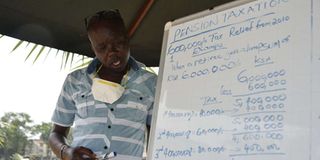Urgent: Protect pension funds

A pension expert addressing retirees in Mombasa.
What you need to know:
- Occupational pension schemes are sponsored by companies.
- Employers make monthly deductions on salaries of employees and then hand it over to service providers.
- Occupational pension schemes are run by a board of trustees, mainly composed of top dogs of the company.
How safe is your pension? I think Kenyans who contribute money to individual pension schemes are badly exposed. Last week, a whistle-blower, who is an employee of a leading pensions administrator, visited my office, where he proceeded to dump a heap of documents including multi-year audited accounts, balances of member contributions and statements of individual contributors.
The whistle-blower’s intention was to show me how the directors of the company had devised clever schemes to steal hard-earned savings of unwitting contributors. I agreed to listen to the presentations as the assets at risk are huge: The money under management is in excess of Sh1 billion and the number of people whose savings are exposed is also massive.
The documents show the number of citizens who have been painstakingly forking out part of their earnings every month and handing it over to an administrator to invest on their behalf number 3,200.
Briefly, occupational pension schemes are sponsored by companies, whereby employers make monthly deductions on salaries of employees and then hand it over to service providers — fund managers, custodians and administrators. Appointment of these service providers must be approved by the Retirement Benefits Authority (RBA).
Make key decisions
Occupational pension schemes are run by a board of trustees, mainly composed of top dogs of the company, including employee representatives, that meets regularly to supervise and monitor the work of service providers. They make key decisions — such how much money can be invested in property, offshore investments, equities and government paper. Most importantly, they decide on distribution and allocation of profits made from investments.
In the case of individual pension schemes, individuals can contribute directly into schemes towards saving for retirement. The level of scrutiny that happens in occupational pension schemes does not happen in individual schemes. The contributors are dispersed and rarely congregate in one room to compare notes on matter of interest, including debating annual accounts.
The whistle-blower’s dossier is a catalogue of irregularities by an administrator of a retirement benefits scheme. You see cases where employees of the administrator who have left are paid their benefits from money belonging to contributors, even when the administrator had not been remitting contributions.
There are cases where top managers drew millions of shillings from a beneficiary trust for the company to purchase a house. In the accounts are unexplained differences between the value of assets held by the individual pension scheme and the register for accumulated member contributions.
The whistle-blower tells me that the matter was reported to the Directorate of Criminal Investigations (DCI) nearly two years ago but that the investigations are yet to yield any action. I gather that investigators have indicated that they have not made progress as there are no complaints.
Yet the truth of the matter is that the unwitting contributors, who should be the ones lodging complaints to the police, are not in a position to know what is going on with their contributions. I am also told that the RBA also conducted investigations many months ago.
The policy implications are clear. We need to look at regulation of individual personal pension schemes afresh. The self-employed and employees of small firms who contribute their hard-earned pay to these entities need special protection. They are exposed since, as opposed to occupational pension schemes, the reports made to the RBA are not detailed.
A system that forces these entities to provide regular reports, with details on movements in member accounts, is a good starting point. We need to reduce conflict of interest and arm’s length dealings.
In the case reported to me by the whistle-blower, you have a situation where employees of the administrator of the scheme dabble as contributors of the same, private corporate trustees that are hired by the administrator and a separate one run and managed by the same group.
Beneficiary trusts are not regulated. It is an environment bound to be riven with conflict of interest. Depositors in commercial banks that collapse enjoy the protection of the Kenya Deposit Insurance Corporation (KDIC), formerly the Deposit Protection Fund. In the capital markets is the Investor Compensation Fund.
The pensions should, hence, have a scheme — similar to the Pensions Benefits Guarantee of the United States — which can compensate contributors in case an administrator collapses. We must come up with ways of protecting contributors to segregated individual pension schemes.
Mr Kisero is a former business editor of the ‘Daily Nation’. [email protected].





